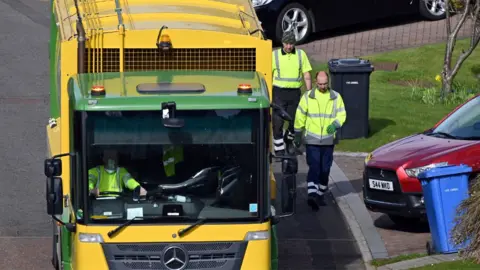Councils say they face worst ever finance pressure
 Getty Images
Getty ImagesCouncil finance chiefs have warned that Scotland's local authorities are facing unprecedented financial pressures.
Glasgow's finance director said all councils were on a "knife edge", with inflation creating huge challenges.
MSPs were told "ring fencing" of central government funding meant services such as libraries, refuse and leisure services would be hit hardest.
The Scottish government said it had given councils an extra £570m for local services in its December budget.
Finance directors from three councils told Holyrood's local government housing and planning committee they faced huge challenges as they prepared to set next year's budgets.
Glasgow's finance director Martin Booth said the pressure from increased inflation had made this year particularly difficult.
He said: "That's what's made this the worst, or most difficult year we've ever had. The demand for services on the back of that because of the cost of living crisis really has been [the worst]."
A common complaint was that most central government funding was directed for specific purposes, giving councils little leeway on where to make savings.
Ministers claim that only 7% of funding is ring-fenced by law, but local authorities estimate that 60-70% is, in effect, earmarked for areas like education and social care.
Argyll and Bute executive director Kirsty Flanagan said that meant cuts were not distributed evenly across services.
"You've got your waste, your bins, your leisure facilities, your cultural facilities - it means it's a deeper cut for them," she said.
 Getty Images
Getty ImagesThe directors from Glasgow, Dundee and Argyll said the bulk of the extra £570m announced in the Scottish budget was linked to new policy initiatives like the rollout of free school meals in P6 and P7, or funding to meet pay deals.
When those commitments were stripped out, that left only about £70m of extra funding for councils, they argued.
They also warned that money allocated for new policies often failed to take into account inflation in future years, meaning that core funding was eroded over time.
Ms Flanagan said policies such as phasing out petrol and diesel small vehicles by 2025 would eat into Argyll and Bute's capital funding grant, meaning there was less available for school building improvements.
Dundee's corporate services director Robert Emmott said the council had already tried to make some services more efficient, so increasingly the only option for significant savings was to do less.
The directors said council tax offered only a limited source of income. Rates would have to rise by 20-25% to cover their estimated budget shortfalls, something that would not be acceptable, they said.
The Scottish government said it recognised the challenging circumstances facing councils, and said "a decade of austerity" had seen a 5% real-term cut in the amount of money that Holyrood received from Westminster.
"Despite this, we have listened to councils and are increasing the resources available to local government to support local services by more than £570m, a real terms increase of £160.6m or 1.3%," a spokesperson said.
"We want to work with local government, to build on the Covid Recovery Strategy and agree an urgent approach which improves delivery of sustainable public services."
